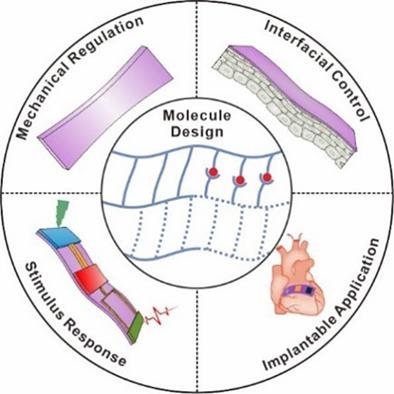当前位置:
X-MOL 学术
›
J. Polym. Sci.
›
论文详情
Our official English website, www.x-mol.net, welcomes your
feedback! (Note: you will need to create a separate account there.)
Implantable application of polymer-based biosensors
Journal of Polymer Science ( IF 3.9 ) Pub Date : 2021-08-27 , DOI: 10.1002/pol.20210543 Xiangyuan Mei 1, 2 , Dekai Ye 1 , Fengjiao Zhang 2 , Chong‐an Di 1
Journal of Polymer Science ( IF 3.9 ) Pub Date : 2021-08-27 , DOI: 10.1002/pol.20210543 Xiangyuan Mei 1, 2 , Dekai Ye 1 , Fengjiao Zhang 2 , Chong‐an Di 1
Affiliation

|
Implantable sensors offer a great opportunity to extract physiological information from inside the body by real-time monitoring. With the demand for personal healthcare and point-of-care treatment, a long-term stable sensor of excellent mechanical and biological compatibility with human organs is urgently required. In contrast to rigid electronic devices using silicon or metallic materials, soft sensors are realized by flexible polymers in a simple way, endowing the implantable sensor with a tissue-mimetic structure. In this article, we systematically review the development of implantable electronic sensors based on polymer materials. The unique properties of polymers are introduced, followed by their applications in implantable device fabrication. Strategies to integrate polymers with implantable sensors, encompassing device interface, geometry, and integration, are also summarized. Furthermore, biosensing applications of polymer-based implantable devices are described, ranging from physical stimulus monitoring to biochemical analysis in vivo. Finally, we envision how advances in polymer materials may facilitate the development of intelligent sensors with broader applications in vivo.
中文翻译:

基于聚合物的生物传感器的植入式应用
植入式传感器提供了一个很好的机会,可以通过实时监测从体内提取生理信息。随着对个人保健和即时治疗的需求,迫切需要一种与人体器官具有优异机械和生物相容性的长期稳定传感器。与使用硅或金属材料的刚性电子设备相比,软传感器由柔性聚合物以简单的方式实现,赋予可植入传感器以组织模拟结构。在本文中,我们系统地回顾了基于聚合物材料的植入式电子传感器的发展。介绍了聚合物的独特性能,然后介绍了它们在可植入设备制造中的应用。将聚合物与可植入传感器集成的策略,包括设备接口、几何形状、和整合,也进行了总结。此外,还描述了基于聚合物的可植入设备的生物传感应用,范围从物理刺激监测到体内生化分析。最后,我们设想聚合物材料的进步如何促进智能传感器的开发,并在体内具有更广泛的应用。
更新日期:2021-08-27
中文翻译:

基于聚合物的生物传感器的植入式应用
植入式传感器提供了一个很好的机会,可以通过实时监测从体内提取生理信息。随着对个人保健和即时治疗的需求,迫切需要一种与人体器官具有优异机械和生物相容性的长期稳定传感器。与使用硅或金属材料的刚性电子设备相比,软传感器由柔性聚合物以简单的方式实现,赋予可植入传感器以组织模拟结构。在本文中,我们系统地回顾了基于聚合物材料的植入式电子传感器的发展。介绍了聚合物的独特性能,然后介绍了它们在可植入设备制造中的应用。将聚合物与可植入传感器集成的策略,包括设备接口、几何形状、和整合,也进行了总结。此外,还描述了基于聚合物的可植入设备的生物传感应用,范围从物理刺激监测到体内生化分析。最后,我们设想聚合物材料的进步如何促进智能传感器的开发,并在体内具有更广泛的应用。











































 京公网安备 11010802027423号
京公网安备 11010802027423号